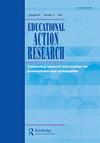庆祝行动研究中的问题
IF 1.2
Q3 EDUCATION & EDUCATIONAL RESEARCH
引用次数: 0
摘要
本期文章的范围满足了本刊邀请作家和读者就行动研究进行良好对话的愿望。论文的质量可以从数量上看出,这些论文通过挑战一些关于行动研究的流行假设,给读者带来了刺激性的干扰。作家们解决了他们的研究计划和研究经历之间的差距,表明随着他们对实践转变的复杂性的高度认识,需要不断修改提高参与度的积极意图。其他论文显示了调整行动研究方法以应对国家教育政策变化或质疑将从业者研究纳入师生计划所声称的结果的各种好处。德勒兹启发的一篇论文对基础数据方法的局限性提出了健康的挑战。一个基于课堂的研究项目探讨了利用教师权威帮助学习者变得更加自律的现实悖论,而其他论文则强调了如何适应更积极、更综合、更全面的教学环境,以取得渐进和暂时的进步。每一篇论文都提供了关键发展的证据,以实现更具社会公正性的实践,因为从业者和参与者培养了更大的代理意识来帮助自己和他人。例如,Stuart的文章《有问题的参与:对教育不平等参与行动研究过程和结果的反思》强调了一系列权力差异,这些差异在学者尝试“参与式”研究时往往是隐含的。她的叙述考察了一个国际项目,该项目旨在让高等教育学生与学生群体合作,审视他们的教育经历。Stuart承认学术界人士、他们的高等教育学生以及与高等教育学生一起研究的学童之间存在着复杂的权力关系,并得出结论,结构性差异无法轻易消除,但如果这些差异能够得到承认和阐明,障碍就可以减少。她描述了如何鼓励参与团体设计社交活动,使研究人员能够“命名和半管理现有的权力动态”。这篇论文充满了一个致力于减少不平等现象的研究团队的宝贵反思性见解,并强调了该团队在赞赏他们与联合研究人员和年轻人进行研究时的紧张情绪,Stuart得出结论,他们的工作可能被视为“参与性实践”,而不是“参与性研究”。这种公开的反射性描述是对行动研究方法的思考,当我们试图在研究关系的流动世界中实现自己的抱负时,需要如何不断修改和重新构想行动研究方法。Oosterhoff和Nanda的论文《印度禁酒时期酗酒和债役的参与性行动研究》继续关注参与性参与的问题,对2022年教育行动研究的尝试进行了引人入胜的分析,第30卷,第337-341号https://doi.org/10.1080/09650792.2022.2079823本文章由计算机程序翻译,如有差异,请以英文原文为准。
Celebrating the problematics in action research
The range of articles in this edition fulfils the aspiration of this journal to invite writers and readers to engage in good conversations about action research. The quality of the papers can be seen in the number which offer stimulating disruptions for readers by challenging some of the popular assumptions that can be held about action research. Writers tackle the gaps between their research plans and their research experiences, showing how positive intentions to improve participation need to be constantly modified as they gain heightened awareness of the complexities of shifting practice. Other papers show the variable benefits of adapting action research approaches to address national education policy changes or question the claimed outcomes from building practitioner research into student teacher programmes. There is a healthy challenge from a Deleuze-inspired paper to the limitations of grounded data approaches. A classroom-based research project examines the practical paradox of using teacher authority to help learners become more self-disciplined, while other papers highlight how movements towards more active, integrated and holistic teaching environments need to be adapted to make incremental and provisional progress. Each paper provides evidence of critical development towards the goal of achieving more socially just practices, as practitioners and participants develop a greater sense of agency to help themselves and others. For example, Stuart’s article, ‘Problematic participation: reflections on the process and outcomes of participatory action research into educational inequalities’ highlights a range of power differentials that are often implicit when academics attempt ‘participatory’ research. Her account examines an international project that aimed to engage Higher Education students in working with groups of schoolchildren to examine their educational experiences. Stuart acknowledges the complex power relationships between academics, their HE students, and the schoolchildren with whom the HE students were researching, and concludes that structural differences cannot easily be erased, but barriers can be reduced if these differences can be acknowledged and articulated. She describes how participating groups were encouraged to devise social activities which enabled the researchers ‘to name and semi-manage the power dynamics present’. This paper is filled with valuable reflective insights from a research team struggling to reduce inequalities, and highlights the tensions of the team in appreciating that they were conducting research with co-researchers and on young people, and Stuart concludes that their work may be considered ‘participatory practice’ rather than ‘participatory research’. This openly reflexive account acts as a meditation on how action research methodology needs to be continually revised and reimagined when attempting to realise our ambitions in the fluid world of research relationships. Continuing the focus on the problematics of participatory engagement, Oosterhoff and Nanda’s paper ‘Participatory action research on alcoholism and bonded labour in times of prohibition in India’ provides a fascinating analysis of attempts to engage EDUCATIONAL ACTION RESEARCH 2022, VOL. 30, NO. 3, 337–341 https://doi.org/10.1080/09650792.2022.2079823
求助全文
通过发布文献求助,成功后即可免费获取论文全文。
去求助
来源期刊

Educational Action Research
EDUCATION & EDUCATIONAL RESEARCH-
CiteScore
3.10
自引率
8.30%
发文量
48
期刊介绍:
Educational Action Research is concerned with exploring the dialogue between research and practice in educational settings. The considerable increase in interest in action research in recent years has been accompanied by the development of a number of different approaches: for example, to promote reflective practice; professional development; empowerment; understanding of tacit professional knowledge; curriculum development; individual, institutional and community change; and development of democratic management and administration. Proponents of all these share the common aim of ending the dislocation of research from practice, an aim which links them with those involved in participatory research and action inquiry. This journal publishes accounts of a range of action research and related studies, in education and across the professions, with the aim of making their outcomes widely available and exemplifying the variety of possible styles of reporting. It aims to establish and maintain a review of the literature of action research. It also provides a forum for dialogue on the methodological and epistemological issues, enabling different approaches to be subjected to critical reflection and analysis. The impetus for Educational Action Research came from CARN, the Collaborative Action Research Network, and since its foundation in 1992, EAR has been important in extending and strengthening this international network.
 求助内容:
求助内容: 应助结果提醒方式:
应助结果提醒方式:


